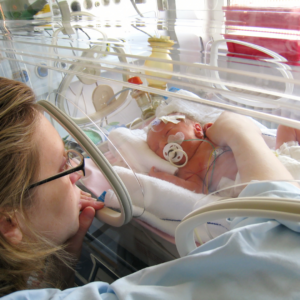The North Carolina Justice Center is partnering with mission-driven organizations like Women AdvaNCe to help ensure that living, working, and raising a family in North Carolina are dignified, supported experiences. Together, we are working to secure four main accommodations to benefit North Carolina residents: 1) Paid Sick and Safe Days, 2) Paid Family Medical and Parental Leave, 3) Pregnancy Accommodations, and 4) Living Wages.
PAID FAMILY MEDICAL AND PARENTAL LEAVE
 As soon as we are born, we rely upon others for our every need. In time, most of us return the favor for our caregivers. Life naturally progresses through cycles of giving and receiving care: when we are born, our parents care for us, as we enter adulthood, we care for children, as our parents age, we care for them. Caring for family is a fundamental part of life.
As soon as we are born, we rely upon others for our every need. In time, most of us return the favor for our caregivers. Life naturally progresses through cycles of giving and receiving care: when we are born, our parents care for us, as we enter adulthood, we care for children, as our parents age, we care for them. Caring for family is a fundamental part of life.
However, when we enter into these intergenerational cycles of care, we never really know what is in store for us. Family members can contract illness, develop chronic conditions, experience an accident or injury, or lose the ability to care for themselves. Oftentimes, the responsibility falls on the caregiver to accommodate their schedule to the needs of those for which they care. Needless to say, balancing a caregiving schedule and employment can be extremely challenging.
Women AdvaNCe spoke with Eric, whose first child was born weeks prematurely in December of 2021. Eric recalls, “after he was born his mom held him for five minutes, and I held him for two, then the doctor took him away to the NICU because he wasn’t breathing right.”
The next few months were a whirlwind of medical tests, operations, doctor briefings, and long days and nights spent in hospital waiting rooms. Eric and his fiancé quickly learned their baby had three holes in his heart and a weakened aortic valve, making it difficult for him to pump adequate blood to the rest of his body. To make matters worse, Eric has been unable to find a steady source of income to support his growing family at this time.
Eric reports that he just started a new job, paid by the hour, at a local warehouse. However, because he has only been with this company for a few weeks, he does not yet qualify for any family medical leave, let alone paid family medical leave. He says:
“Now my son is out of the hospital, but he’s still dealing with problems, like, he’s not gaining weight properly. He has three appointments a week. I can’t find a job that fits in with our schedule. I just have to accept what I can and hope I don’t get fired, because I need time to be there for my kid… I already missed two days this week for my son. So I just don’t know how long this is gonna last.”
According to the U.S. Department of Labor, Family and Medical Leave (FMLA) is described as 12 weeks of unpaid, job-protected leave per year. Employees can qualify for this unpaid leave if they have worked for more than 12 months for a certain company that employs more than 50 people. In addition, FMLA is only reserved for certain events, limited to:
- The birth and care of a newborn child
- The placement of a child for adoption or foster care
- To care for an immediate family member (i.e., spouse, child, or parent) with a serious health condition
- To take medical leave when the employee is unable to work because of a serious health condition
In its current state, FMLA blocks workers from receiving the leave they need to care for their families or themselves. The 12-month stipulation prevents recently-hired employees from taking time off without risking their jobs. In addition, FMLA allows for unpaid, job-protected leave. Although this means that someone qualifying for FMLA does not risk their position, they do forfeit 100% of their pay during their time off. Oftentimes, caring for a family member comes with an additional cost burden to the caregiver, whether that is finding a new place to live, paying for medication, or purchasing medical equipment. Employees who need to take time off to care for family need their full pay more than ever.
OUR CALL TO ACTION:
North Carolina – protect the employees who risk their livelihood in order to care for sick family.
 Emma Hergenrother is from Ridgefield, CT. She is excited to be currently living in Durham, NC, and contributed to Women AdvaNCe as a Research Fellow. Earning her Bachelor’s from Princeton University, Emma majored in religion with a focus on the relationship between religious attitudes, theological beliefs, and environmentalism. Since graduation, Emma has worked for an affordable housing nonprofit in Connecticut, and is currently studying to become a physician with a focus on pediatric health. In her free time, Emma enjoys cooking with her partner, going for long walks, and diving into her latest audiobook.
Emma Hergenrother is from Ridgefield, CT. She is excited to be currently living in Durham, NC, and contributed to Women AdvaNCe as a Research Fellow. Earning her Bachelor’s from Princeton University, Emma majored in religion with a focus on the relationship between religious attitudes, theological beliefs, and environmentalism. Since graduation, Emma has worked for an affordable housing nonprofit in Connecticut, and is currently studying to become a physician with a focus on pediatric health. In her free time, Emma enjoys cooking with her partner, going for long walks, and diving into her latest audiobook.

There are no comments
Add yours